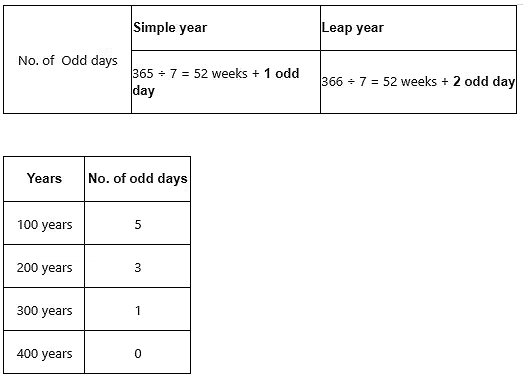Practice Questions: Calendar- 1 | Quantitative Techniques for CLAT PDF Download
Q1: If the day after tomorrow is Thursday, what day was it yesterday?
(a) Tuesday
(b) Sunday
(c) Monday
(d) Saturday
Ans: (c)
If the day after tomorrow is Thursday, today must be Tuesday. Therefore, yesterday was Monday.
Q2: If today is Friday, what day of the week will it be 350 days from today?
(a) Monday
(b) Friday
(c) Saturday
(d) Sunday
Ans: (b)
350 days = 50 weeks, so it will be the same day of the week, which is Friday, 350 days from today.
Q3: How many odd days are there in 900 years?
(a) 0
(b) 5
(c) 3
(d) 4
Ans: (a)
In 900 years, there are 682 common years (1 odd day each) and 218 leap years (2 odd days each).
Total odd days: 682 + (218 × 2) = 1,118. 1,118 mod 7 = 5.
Answer: 5
Q4: On which day of the week did India celebrate its first Republic Day on January 26, 1950?
(a) Thursday
(b) Friday
(c) Sunday
(d) Tuesday
Ans: (a)
- Odd days from 1949 years = 6.
- Odd days from 26 days = 5.
- TOTAL = 0 + 1 + 24 + 37 + 5 = 67 odd days.
- 67 ÷ 7 = 9 weeks + 4 days, so 67 mod 7 = 4 odd days
which basically means thursday
Q5: If today is Thursday, how many days are there until the next Friday?
(a) 6
(b) 7
(c) 8
(d) 9
Ans: (a)
If today is Thursday, then the next Friday is just one day away, so there are 6 days until the next Friday.
Q6: If March 2, 2040, is a Saturday, what day of the week will it be on March 2, 2050?
(a) Saturday
(b) Sunday
(c) Monday
(d) Tuesday
Ans: (b)
Since 2040 is a leap year, March 2, 2041, will be one day ahead (Sunday). For each non-leap year, it will advance one more day. Therefore, March 2, 2050, will be on a Sunday.
Q7: Which of the following is not a leap year?
(a) 2024
(b) 2100
(c) 2028
(d) 2032
Ans: (b)
A leap year occurs every 4 years, but century years (divisible by 100) are not leap years unless they are divisible by 400. So, 2100 is not a leap year.
Q8: If January 1, 2024, falls on a Monday, what day of the week will January 1, 2025, be?
(a) Tuesday
(b) Thursday
(c) Wednesday
(d) Friday
Ans: (c)
2024 is a leap year with 2 odd days.
So, January 1, 2025, will be Wednesday
Q9: A leap year is defined as:
(a) A year that is divisible by 4
(b) A century year divisible by 400
(c) A non-century year divisible by 4
(d) Both (b) and (c)
Ans: (d)
A leap year can be either a century year divisible by 400 (e.g., 2000) or a non-century year divisible by 4 (e.g., 2020).
Q10: How many odd days are there in 150 years?
(a) 0
(b) 1
(c) 5
(d) 3
Ans: (c)
In 150 years, there are 37 leap years and 113 normal years.
Total odd days = 37×2 + 113×1 = 187 → 187 ÷ 7 = 26 weeks and 5 odd days
|
49 videos|179 docs|73 tests
|






















